Persian Fire: History like Harold Lamb Used to Do It
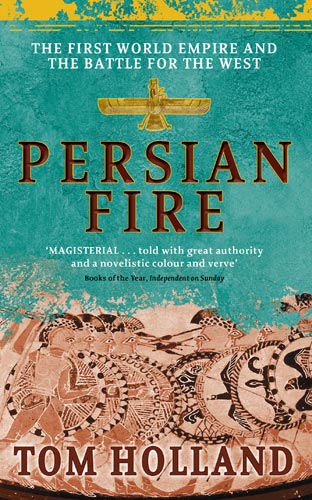
300 without the attack rhinos, Greece versus the known world, and — best of all — the Persian Wars from the Persian perspective. You can see how Persian Fire by Tom Holland ended up as another one of my Barter Books finds.
It’s a book that doesn’t quite live up to the promise on the dust jacket, but does deliver something else almost as spectacular. Yes, he launches us into the history of the Persian Empire and what came before it. However, a few chapters in and Athens and Sparta steal the story.
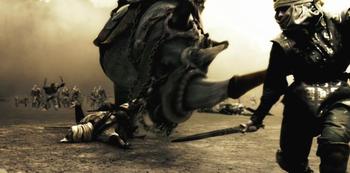
It’s not Holland’s fault.
Though he draws on archaeology to bring to life the palaces and people of Persia, just like other historians, he has but one substantial contemporary source: Herodotus, the father of History. The end result is a retelling of — to those of us who have studied Ancient History — a very familiar tale.
However, this is a tale supremely well and wisely told, pretty much as Harold Lamb would have done it. (It’s also the kind of sweeping history that the History Manifesto calls for, but which academics rarely seem to deliver (because few of them could write their way out of a paper bag).)
Holland understands politics and strategy, has no axe to grind. He has an eye for the moves and countermoves playing out amidst the fractal chaos of History. He guides us through the power politics of Persia, the pork-barrel shenanigans of the Athenian democracy, and the weird hyper-macho ritualised chest beating of Spartan public life. He also understands the role of Persian intelligence operations, the importance of logistics, and sees both the big and the small pictures.
It helps that he presents the ancient people and peoples as they were, not baby fascists nor infant democrats.
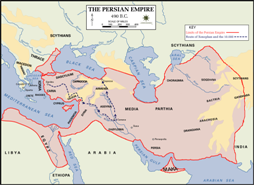
His Persians are not the monolithic Other Empire echoed by Tolkien and CS Lewis. They have only recently come out on top of the shuffling peoples battling for supremacy over the remains of the Assyrian Empire. They are fanatical about Truth, meaning they tell big lies: “I didn’t depose the real King, this one was an imposter.” Their kings are culturally and religiously triumphalist, but rule over a multi-cultural empire. They are mostly just and cultured, enjoy gardening and epicurean food, but quite capable of on-the-spur executions: The army marching out on the Salamis campaign does so between the sawn-in-half remains of the son of a former favorite. (Why? That would be a spoiler.)
The Greeks are envious, xenophobic, backstabbing, mostly misogynistic slave owners, not better or worse than anybody else in their time. Though not priest-ridden, they are superstitious to a fault. Festivals delay campaigns, omens halt battles. Ambassadors thrown down wells must be atoned for. Each polity is fiercely independent, and yet en-webbed in the utterances of the Delphic Oracle. The Spartans are, well Spartan, but always punch below their weight internationally because they need their soldiers at home to keep their serfs ground down. The Athenians seem to exist to flaunt democracy’s worst traits: infighting, ostracisms (literally), political prosecutions, and unprincipled self-interest — the franchise does not extend to women or to slaves.
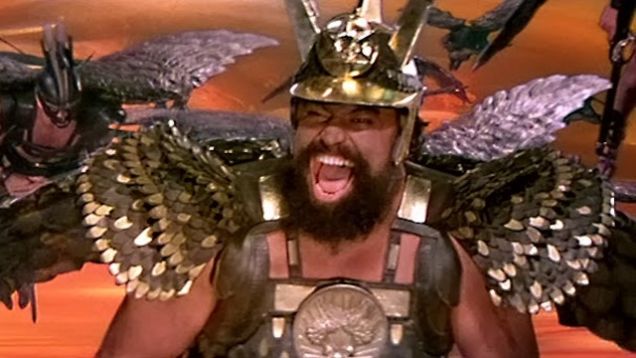
These are sometimes uncomfortable truths. But, like Harold Lamb before him, Holland does not judge. Rather he alternately watches with interest or claps his hands with glee. Imagine if Brian Blessed’s Voltan, King of the Hawkmen wrote a history of Mongo and you have Holland’s attitude.
His battle descriptions stand out as masterful.
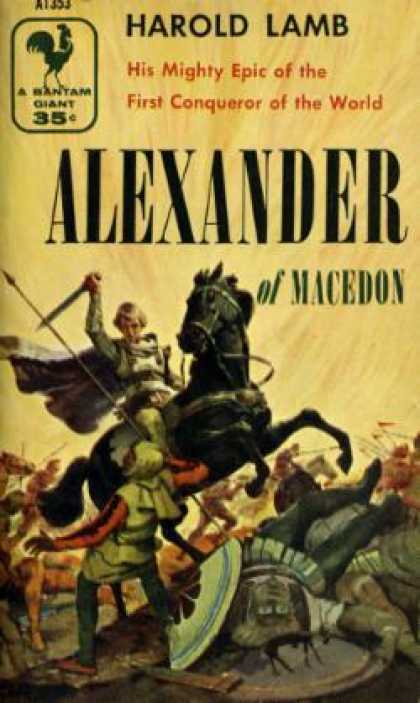
This is quite an achievement given how the battles of this time offer so little tactical interest. Yes you get some manoeuvring and some bluff and double bluff to bring the enemy to battle. However, when the battle is joined, it’s down to grunting and shoving with the Spartan Hoplites like the Cookie Monster, chewing up more lightly armed units and scattering the crumbs.
At Platea, for example — SPOILER WARNING — the Greek manoeuvres had gone awry. The Persians had cut off their food and water, the Greeks had tried an orderly withdrawal, only to end up scattered around cavalry-friendly terrain. All the Persians had to do was defeat them in detail. However, when the Persians came to grips with the outnumbered Spartan contingent, the Spartans simply made like a collective Conan and kept killing them until they routed. It helped when one Spartan killed the Persian satrap using a well-thrown rock. (Yes, a rock.)
And Holland puts us there, sun baking our bronze armour, sweat in our eyes. He scoops up fragments of biography, makes connections, makes humans of the little armoured figures.
The caveat is that, just like Harold Lamb, this is History Without Footnotes, nothing to pillage for student paper, but something you can enjoy on cold autumn evening when your imagination yearns for otherwhen. The scholarship is awe-inspiring, but Holland doesn’t hedge his (very plausible) reconstructions of thought or culture with “arguably” and “perhaps”, nor does he bury us in citations.
Perhaps there are two kinds of historical truth. One to do with sources and evidence, the other to do with history as a real thing that happened to real people with real emotions in real places with real backstories.
If so, I suspect that a book can present one or the other, but not both. I’m not sure which truth matters most, but I do know which I prefer to read.
Is anybody else writing history books like this?
M Harold Page (www.mharoldpage.com) a life-long student of all things knightly, is poised to launch is old-school Heroic Fantasy trilogy, Swords Versus Tanks. While you’re waiting for that, you can buy his action-packed Dark Age adventure, Shieldwall: Barbarians! (UK, Epub) and also learn how to plan and write your novels using his Storyteller Tools (UK, Epub).
Sold.
I’ve looked at it. Thought about buying it. Put it back on the shelf.
But now: Sold!
Why?
“Imagine if Brian Blessed’s Voltan, King of the Hawkmen wrote a history of Mongo and you have Holland’s attitude.”
If this isn’t the single coolest line to ever appear in a review of a history book, well, I’m very much mistaken.
Of course now I would give all my worldly possessions for a copy of Voltan’s History of Mongo.
An “Anti-300”? Those seem to be in season. Ref io9 advertising, er ‘reviewing’ a comic called ‘democracy’ that they herald as such…
Won’t waste time arguing any point here – I’ll simply ask this-
IF – Mr Miller hadn’t written 300, if it hadn’t been made into an over the top action movie…
Would the writer have wrote this story?
Would the publisher have published it?
Hey, that’s capitalism… I’ve noticed also whenever a “Basement Dungeon” fiend gets in the news – (you know, keeps people locked up for years, decades and does horrible things to them) the hardware stores seem to fully stock all the components just short of D.I.Y. kits endorsed specifically by the criminals from jail…
@GreenGestalt – I have no beef with the movie! (My current project is called Swords Versus Tanks – I’m THAT kind of writer). I just meant it was interesting to read about the real 300, which was almost as Metal as the movie.
The book tells the 300 story as per the sources and makes an epic tale of it.
As for democracy… this book rather puts you off the Athenians as paragons of early people power.
Another one of these big picture, readable histories is available Oct. 1 — The American Slave Coast: A History of the Slave-Breeding Industry. It covers roughly 400 years of European, African, Caribbean history’s impact on the creation of the North American colonial and antebellum U.S. economy.
Hmmm…all this thread lacks is a real knock on 300, so I’ll be happy to supply it. I don’t think I’ve ever seen a movie I loathed more.
I’ve not seen it. But I think people who watched it will mostly realize it’s a fantasy riff on a real event, and some of them may therefore be made aware of the real event for the first time and that this is a good thing.